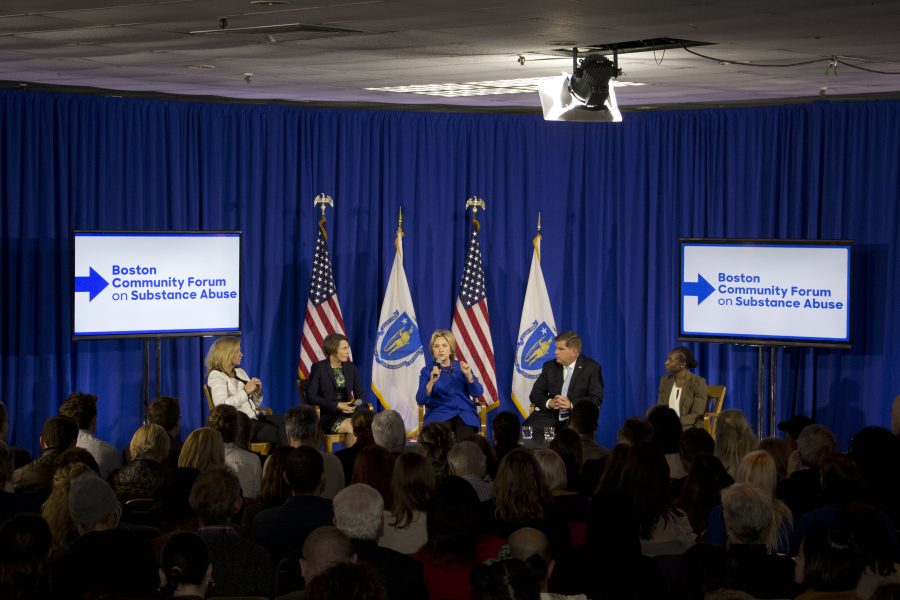“It is a disease that has rippled through every community in the state: it doesn’t matter your race, your ethnicity, it doesn’t matter how loved or how well you’ve been cared for, It doesn’t matter how much money you make” said Attorney General Maura Healey in a forum that took place on October 1 at the Boston Teacher’s Union. The Union building which is located in the former Bayside Exposition Center Complex on Mt Vernon St, hosted some big names in politics including former Secretary of State and now Democratic presidential candidate, Hillary Clinton.
Clinton and Healey were also joined by Boston Mayor Marty Walsh. President Myechia Minter-Jordan, who heads the Dimrock Center (one of two detox centers in Boston), was also present on the stage.
The main focus of the event was to discuss the epidemic involving opiates; mainly heroin, but also fentanyl and pills like OxyContin. This was the third stop where Clinton discussed these issues.
Many of the politicians agreed with each other on many of the points including that more needs to be done to help people who have issues involving substances both legal and illegal. The candidates also said that in order to combat the issue there needs to be more resources in terms of prevention, education, intervention, and treatment.
Besides the speaking of plans and ideas that they would like to put in places the speakers also talked of the numbers of people that are affected by the opiate epidemic.
Attorney General Healey described that for Massachusetts alone “we are losing four to five people a day due to this epidemic here in Massachusetts and that doesn’t begin to count the number of ODs….”
While heroin has gotten a lot of attention recently Healey also raised the issue of fentanyl, a synthetic opiate painkiller. Healey noted that this opioid is becoming more of a problem. “The cartels have figured out a way to make [it]” said Healey. She told the audience that in order to fight the painkiller she plans to make the “trafficking of fentanyl––which we know is 50-100 times more potent than heroin––a crime.”
Mayor Walsh spoke mainly of the improvements that have occurred in Boston, and while he wants to see more done he believes that discussions about the crisis must happen on all levels “it has to be on a national level, it has to be on a state level, it has to be on a district level, it has to be on a neighborhood corner level.”
While people came to the discussion for various reasons one of the biggest was to hear what former Secretary Clinton had to say, and what she planned to do about the problem. Clinton admitted that what really got her motivated to take on the crisis as part of her campaign was when “the first question I was asked when I got to New Hampshire was ‘what are you going to do about the heroin epidemic?”
In her travels, recovering substance users told Clinton of the stigma that surrounds those are working on “kicking the habit”. One woman told Clinton that “we are not bad people trying to be good, we are sick people trying to get well”.
For those who are trying to get well, Clinton told of the difficulties of getting the necessary care. The candidate told of figures reporting that there are an estimated 23 people million people in the United States who have some kind of substance addiction, whether it be alcohol or drugs, and that of those 23 million only one in ten can get treatment for their disease. Clinton furthered this by commenting that those looking for a facility to get care at may have to wait weeks, if not months, before they can get help, because of the lack of space.
Clinton outlined her plan if she is to be elected, which she described as a 10 year plan that would work with states and cities to fight the opiate problem, and that she would work to get $10 billion in funding to make it work. The plan, according to the presidential candidate would support those cities and states that come up with good plans on how to prevent and respond to the rising crisis. Of the $10 billion, $7.5 billion of it would go to cities and states that can demonstrate that their plans work. Clinton stated that she believes this would provide an example to other places throughout the country, not only of how to make better programs but also to face the problem. “We still have some denial going on here” said Clinton. She explained that the idea behind the funding is that “we have to lift up the best programs”.
After the members on stage were finished speaking, the room was opened up to a question and answer session where people commented and asked the speakers about their various opinions relating to the subject matter.





















































